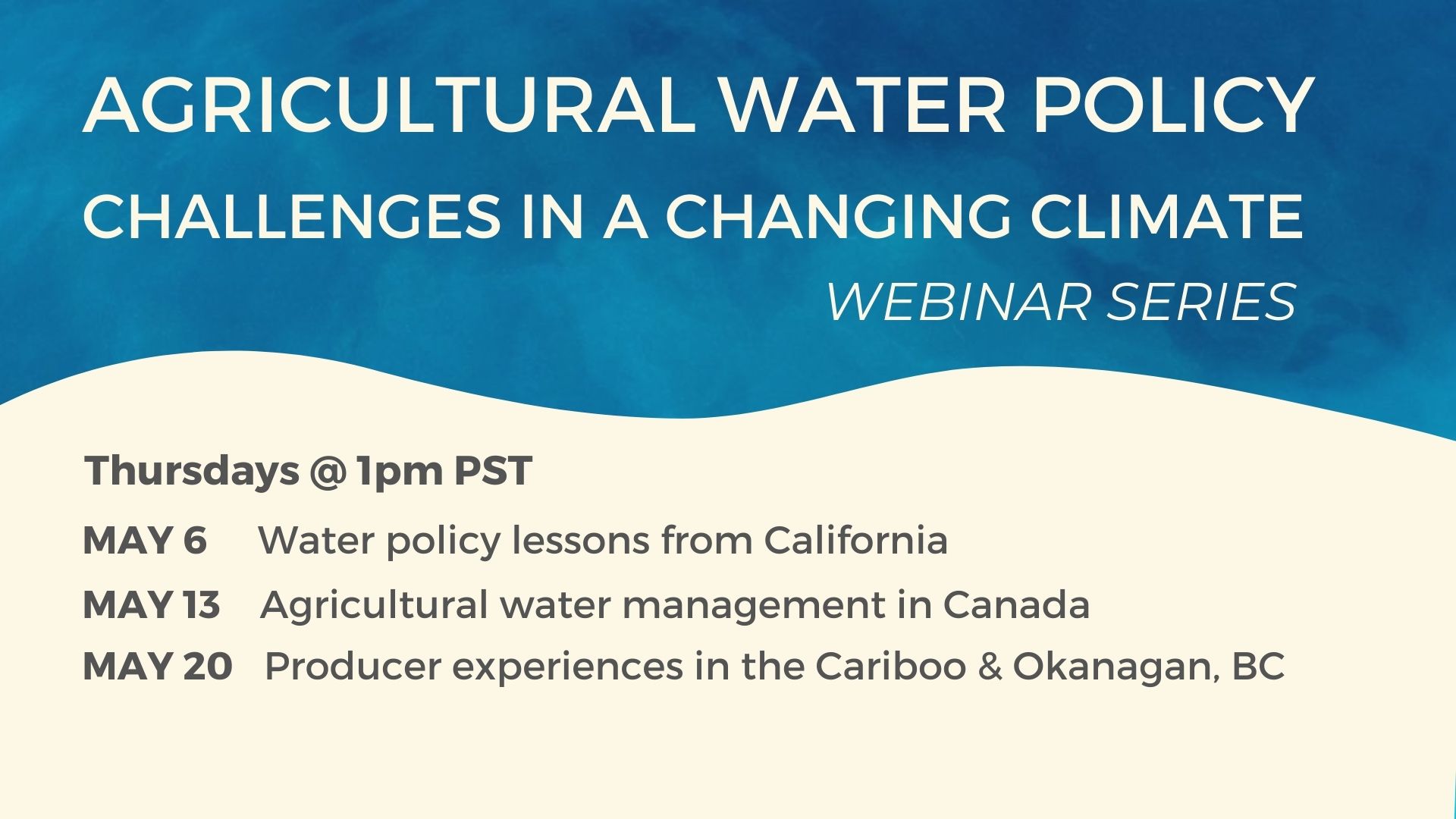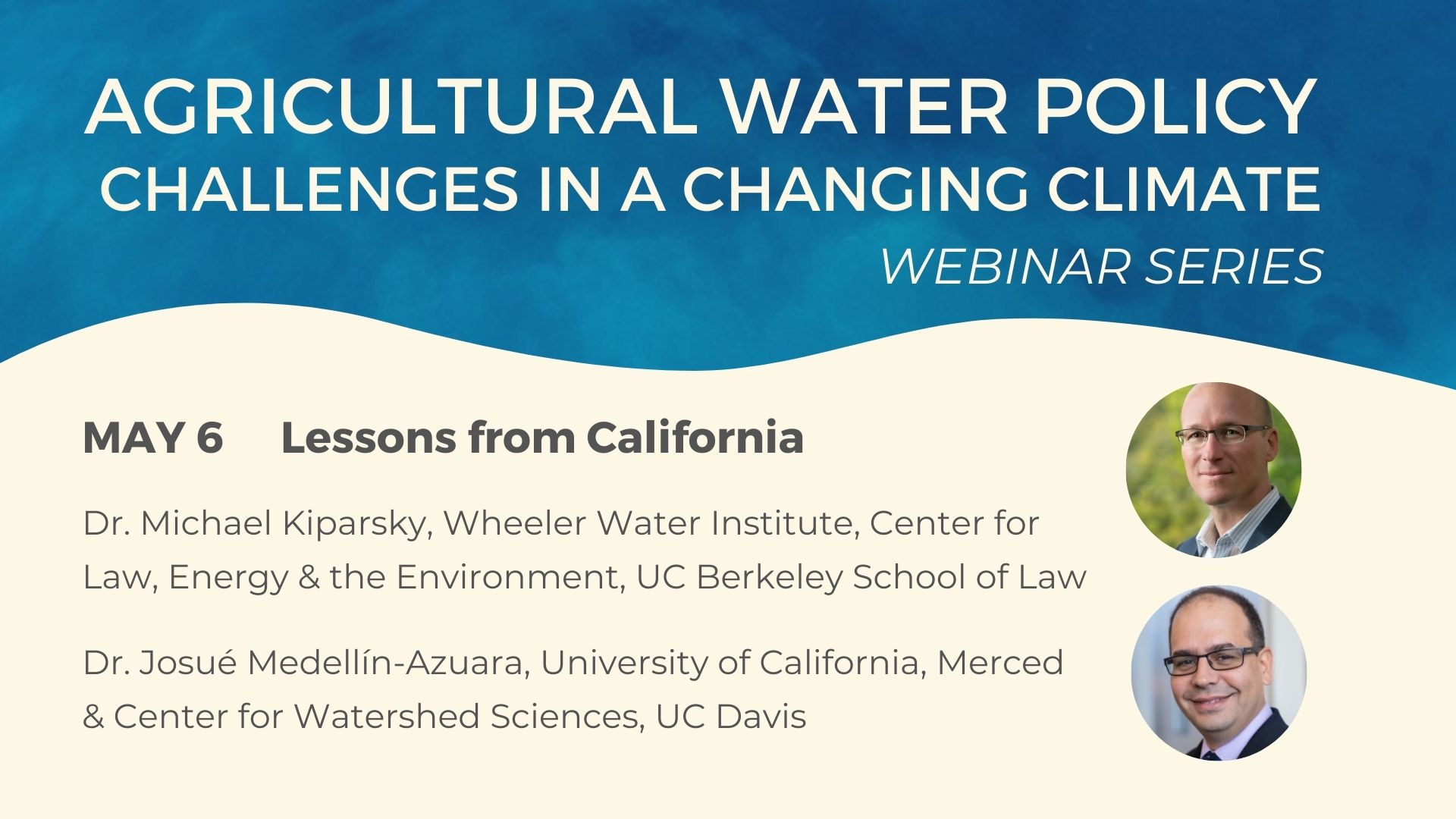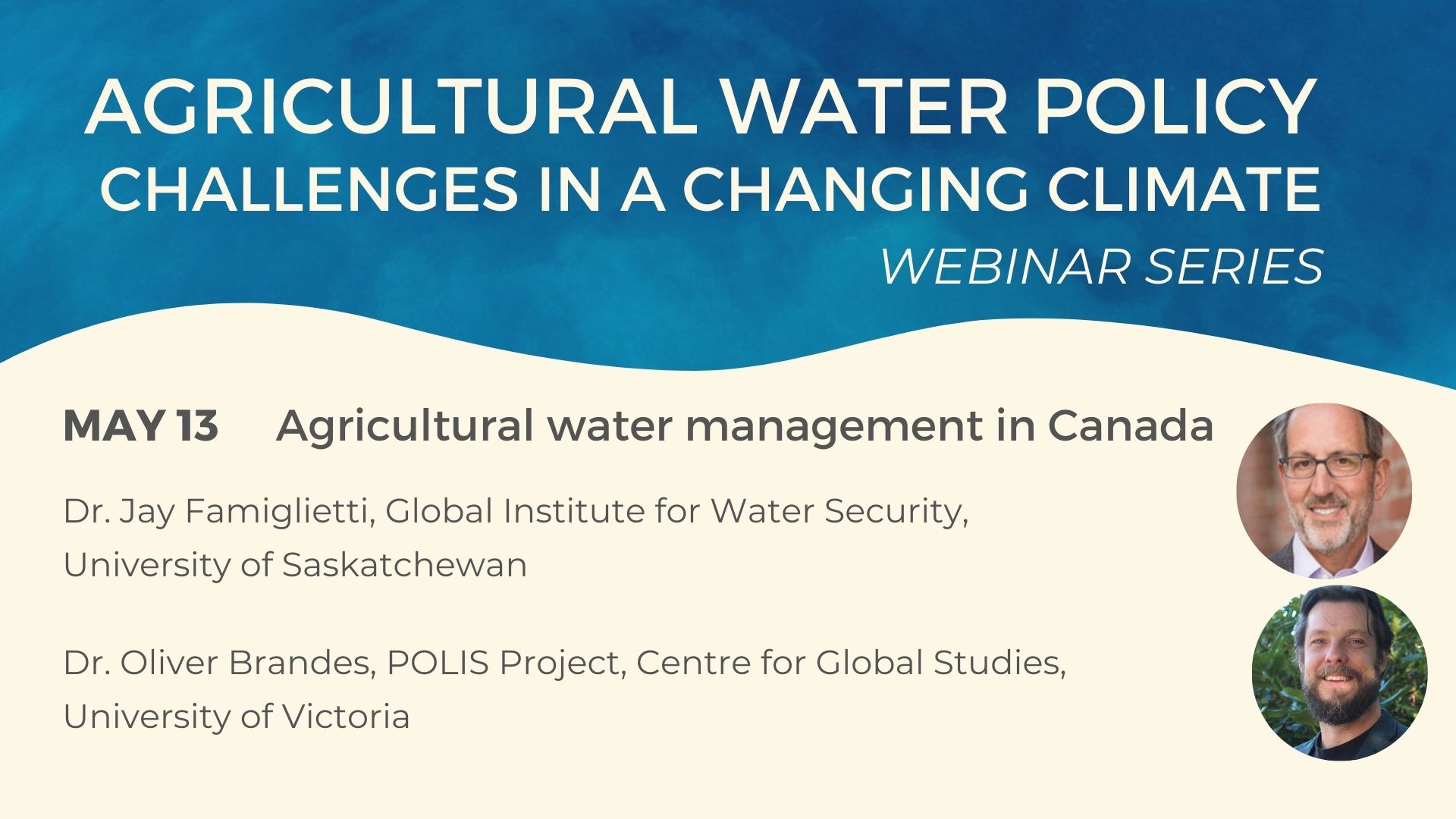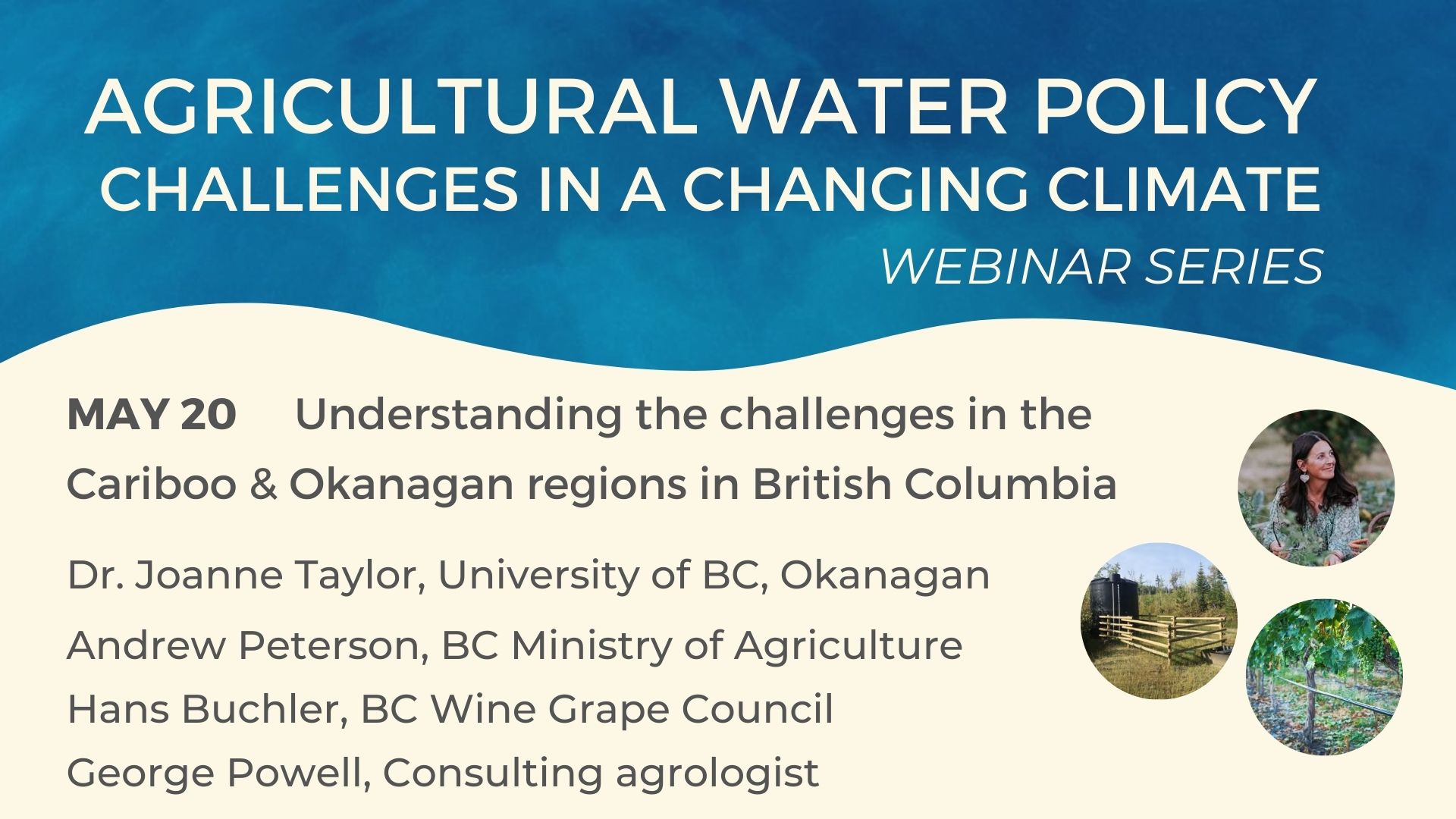
Agricultural Water Policy in a Changing Climate
This three part webinar series explores the role and impact of policy and regulation in managing agricultural water in the face of hotter and drier conditions related to climate change.
This series includes:
- May 6 – Policy experts from California who have been seeking best management options amid long term drought conditions and ever tightening water availability
- May 13 – A discussion on how water availability is changing in Canada and how new BC water policy attempts to improve management
- May 20 – Findings from interviews with agriculture stakeholders in two BC regions— the Cariboo and Okanagan—that point to ways that water policy can both support and constrain producers' efforts to adapt to climate change
Session recordings and registration links are below.
This series is part of the Enhancing the Capacity to Adapt to Climate Change project led by Dr. John Janmaat at the Okanagan campus of the University of British Columbia, and is supported by the Social Sciences and Humanities Research Council.
Session One Recording

Lessons from California
This the first webinar in a 3 part series. The series begins with agricultural water policy and practice in California.
California is facing many of the same climate change challenges that BC is, including increasing water use alongside growing water scarcity. Both jurisdictions are implementing new policies and regulations to manage complex water systems.
Dr. Michael Kiparsky, founding Director of the Wheeler Water Institute at the Center for Law, Energy & the Environment at the UC Berkeley School of Law, and Dr. Josué Medellín-Azuara, Associate Professor at UC Merced and Director at Davis Center for Watershed Sciences, will discuss how implementation of water policies and regulations for surface and groundwater have impacted the California agriculture industry.
Speakers discuss lessons that can be learned from California, sustainable water management, equitable water use in the context of climate change, and key water governance challenges and successes.
This session included an excellent Q & A period and we could not get to all of the questions during the session. Dr. Josué Medellín-Azuara provided written answers to the questions we could not get to − read them here.
Dr. Micheal Kiparsky shared a link to the California Groundwater Governance report for those looking for more information on California water policy development and implementation.
Session Two Recording

Agricultural Water Management in Canada
Climate change presents urgent challenges for Canadian agriculture, and one of the most pressing is changes in freshwater supply accompanied by increasing demands for water.
This webinar features Dr. Jay Famiglietti, Executive Director of the Global Institute for Water Security at the University of Saskatchewan and Oliver Brandes, Co-Director of the POLIS Project on Ecological Governance at the University of Victoria’s Centre for Global Studies.
They discuss changing water availability throughout Canada and the implications for agriculture and food security. They also provide reflections on the Water Sustainability Act in BC and opportunities for improving water governance in the face of climate change.
In this session presenters shared two resources for more information:
- A POLIS report comparing California and BC water law and lessons learned — California's Oranges, BC's Apples: Lessons for BC from California Groundwater Reform, and
- Also from POLIS, the Advancing Freshwater Protection: Tools and Opportunities briefing note
Session Three Recording

Agricultural Water Management in Canada
Climate change presents urgent challenges for agriculture, but the specific challenges faced can be very different across regions and types of production. Water needs and the impacts of policy needs to be understood at the regional level.
This webinar features Dr. Joanne Taylor, Post-Doctoral Fellow at the University of British Columbia Okanagan, and 3 panelists who are deeply involved in agricultural water issues.
Dr. Joanne Taylor presents initial findings from a Partnership Development Project examining agricultural resilience to climate change in the Cariboo and Okanagan regions of BC with a focus on water. The research included a review of regulations and policies in BC related to water supply and agriculture as well as interviews that explored how the implementation of BC water policies is affecting the resilience of agricultural producers to climate change.
Three guest panelists - Andrew Petersen (BC Ministry of Agriculture), George Powell (consulting agrologist) and Hans Buchler (BC Wine Grape Council and the Canadian Grapevine Certification Network) - discuss key challenges and opportunities that exist for water supply management in both the Okanagan and Cariboo.
In this session presenters shared two resources for more information:
- A fact sheet on BC Farm Water Storage
- More information on the UBCO led project on Enhancing the Capacity to Adapt to Climate Change
Speaker Bios
Dr. Michael Kiparsky
Governance and Innovation under California’s Sustainable Groundwater Management Act – Early Lessons for (and from) the Water Sustainability Act
Michael Kiparsky is the founding Director of the Wheeler Water Institute within the Center for Law, Energy & the Environment at the UC Berkeley School of Law. He has worked on technical and policy aspects of water resources management for 15 years, and has experience in consulting, non-profit, and agency settings.
Dr. Josué Medellin-Azuara
Managing Sustainable Agroecosystems and Communities under Climate Extremes: Evolving Insights from California
Josué Medellín-Azuara is an Associate Professor in the School of Engineering at the University of California, Merced. He is also an Associate Director for the UC Davis Center for Watershed Sciences and the UC Agricultural Issues Center, and an Adjunct Research Fellow at the Public Policy Institute of California. He has worked as an advisor, consultant and collaborator for numerous NGOs as well as agriculture and water agencies.
Dr. Jay Famiglietti
Changing Water Availability as Viewed from Space: Implications for Canadian and Global Food Security
Jay Famiglietti is the Executive Director of the Global Institute for Water Security at the University of Saskatchewan, where he holds the Canada 150 Research Chair in Hydrology and Remote Sensing, and a faculty appointment in the School of Environment and Sustainability. A fellow of the American Geophysical Union and the Geological Society of America, Famiglietti is a regular advisor to state, provincial and federal government officials on water security issues.
Dr. Oliver Brandes
BC Water Sustainability Act – Opportunities for innovation in water law and governance
Oliver M. Brandes is an economist and lawyer by training and a trans-disciplinarian by design. He serves as Co-Director of the POLIS Project on Ecological Governance, based at the University of Victoria’s Centre for Global Studies (CFGS), where he leads the award-winning POLIS Water Sustainability Project. His work focuses on water sustainability, sound resource management, public policy development, and ecologically based legal and institutional reform.
Dr. Joanne Taylor
The Impact of Water Regulation on the Agricultural Resilience in the Cariboo and Okanagan regions of British Columbia
Dr. Joanne Taylor is a Social Sciences and Humanities Research Council Post-Doctoral Fellow at the University of British Columbia, Okanagan in the Department of Economics, Political Science, and Philosophy. She is the lead researcher for a Partnership Development Grant project with Dr. John Janmaat investigating agriculture climate resilience in the Okanagan and Cariboo regions of BC. The project examines how the regulatory environment affects resilience to changes in water supply.
Agricultural Water Policy in the Cariboo & Okanagan Panelists
Andrew Petersen
Andrew Petersen graduated from UBC with a degree in Agricultural Science in 1986. For the next 20 years he worked in the irrigation industry focusing on agricultural design and sales. In 2006 Andrew joined the province to work for Ministry of Agriculture as a Water management Specialist. He is a Certified Irrigation Designer and a Professional Agrologist.
George Powell
George Powell is an independent, consulting Professional Agrologist with over 30 years of experience in providing planning, research and development support for sustainable agriculture. Specializing in agroforestry and other integrated production systems and in blending conservation and production practices. George has PhD from the University of Alberta in agroforestry as well as degrees from the University of British Columbia in rangeland ecology and agronomy.
Hans Buchler
Hans Buchler has been growing grapes in the South Okanagan for close to forty years and has been involved in a number of industry associations: first in the Organic sector through the Similkameen Okanagan Organic Producers Association and the Certified Organic Associations of BC and then with the Grape and Wine sector through the R&D committee of the BC Wine Institute and today with the BC Wine Grape Council and the Canadian Grapevine Certification Network.